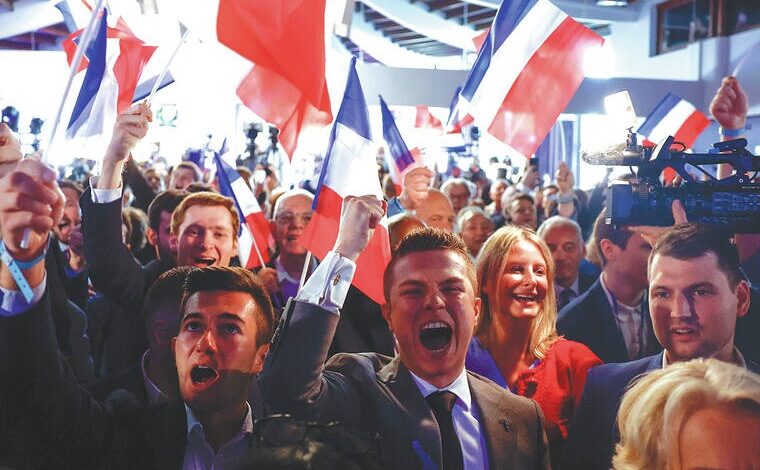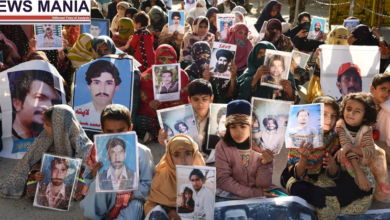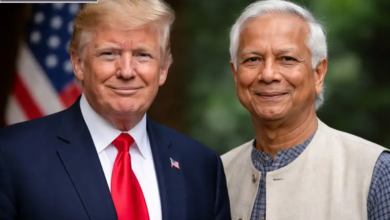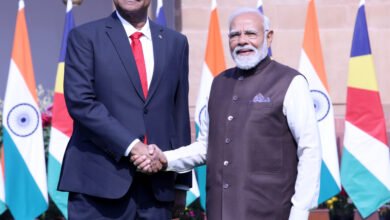France’s Political Landscape Shifts as Far-Right National Rally Gains Ground

News Mania Desk/ Agnibeena Ghosh/ 5th July 2024
France took a significant step towards potentially electing its first far-right government since World War II after Marine Le Pen’s National Rally made notable gains in the first round of parliamentary elections. The anti-immigration and eurosceptic party secured 33.2% of the vote, according to results released Monday by France’s Interior Ministry.
In this election, a coalition of center-left, greens, and far-left parties known as the New Popular Front came in second with 27.9%, while French President Emmanuel Macron’s centrist alliance, Ensemble, finished third with 20.7%. These three political groups will proceed to a crucial second round on July 7.
The path to this election was shaped by President Macron’s dissolution of the National Assembly and his call for a snap election following his party’s poor performance against the National Rally in the European Union parliamentary elections. Although the EU elections do not directly influence the timing of France’s domestic votes, Macron responded to the voter sentiment by scheduling the June 30 vote to reaffirm his mandate.
The rise of far-right sentiment in France can be attributed to the growing appeal of policies advocating for lower immigration, increased security, and economic measures favoring the lower and middle classes. Additionally, there is political resistance to EU regulations on various issues, from farming to human rights. This trend is not unique to France, as populist movements are gaining traction globally.
Macron’s tenure has been marked by controversial reforms in retirement, unemployment, and immigration policies. These changes have alienated left-wing voters while appealing to some on the far-right, resulting in months of labor strikes and demonstrations that have eroded his popularity. Political analysts like Cécile Alduy from Sciences Po point out that Macron’s tough stance on immigration and his perceived arrogance have contributed to the surge in support for the far-right.
Jean-Yves Camus, an expert on the far-right at the French Institute for International and Strategic Affairs, notes that Macron’s communication style has often been seen as condescending, which has fueled dissatisfaction among the electorate. His approach to reforms, particularly regarding pension ages, has been criticized for being dismissive of public opinion and parliamentary procedures.
While Macron’s presidency is secure until 2027, the political landscape could shift significantly if the National Rally secures enough seats in the second round. This scenario might lead to the appointment of Jordan Bardella, a 28-year-old rising star in the National Rally, as prime minister. Bardella’s youth, charm, and adept use of social media have made him a popular figure, particularly among younger voters.
Supporters of the National Rally, like Veronique Leclerc, a retired teacher from a village near Fontainebleau, believe the party understands and addresses the concerns of ordinary French citizens, particularly issues related to inflation and security. Leclerc praises Bardella for his intelligence and relatability, which she feels resonate with people from diverse backgrounds.
The second round of voting on July 7 will determine the composition of the 577-seat National Assembly. To achieve an absolute majority, a party needs 289 seats. It remains uncertain whether the National Rally can secure this majority. If no coalition forms a majority, Macron may have to appoint a prime minister from an opposition party, leading to a government of “cohabitation,” where policies may diverge significantly from Macron’s agenda.
Despite the political tension, there are pockets of unity in France, such as the diverse community at the “Balti zone” basketball court in Paris. Here, people from various backgrounds come together, illustrating a more inclusive and cohesive vision of France. Ersan Yetis, a Paris-born illustrator with Turkish roots, emphasizes the importance of community and voting, reflecting a hopeful perspective amid the country’s political divisions.
The unfolding political situation in France highlights the nation’s struggle with its identity and future direction. As the second round of elections approaches, the outcome will have profound implications for France’s domestic and international policies.






